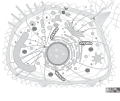Molecular evolution: Difference between revisions
CSV import |
CSV import Tags: mobile edit mobile web edit |
||
| Line 38: | Line 38: | ||
{{stub}} | {{stub}} | ||
<gallery> | |||
File:Site_pattern_frequencies_models.jpg|Site pattern frequencies models | |||
File:Five_Stages_of_Molecular_Phylogenetic_Analysis.png|Five Stages of Molecular Phylogenetic Analysis | |||
File:Ortholog_paralog_analog_examples.svg|Ortholog, Paralog, and Analog Examples | |||
File:Hedgehog_with_Albinism.jpg|Hedgehog with Albinism | |||
File:Animal_cells_SwissBioPics_DL20221120.svg|Animal cells | |||
</gallery> | |||
Latest revision as of 04:35, 18 February 2025
Molecular evolution is a process of change in the sequence composition of cellular molecules such as DNA, RNA, and proteins across generations. The field of molecular evolution uses principles of evolutionary biology and population genetics to explain patterns in these changes. Major topics in molecular evolution concern the rates and impacts of single nucleotide changes, neutral evolution vs. natural selection, origins of new genes, the genetic nature of complex traits, the genetic basis of speciation, evolution of development, and ways that evolutionary forces influence genomic and phenotypic changes.
History[edit]
The study of molecular evolution first became possible in the 1960s, following the rise of molecular biology. The advent of protein sequencing allowed molecular biologists to create phylogenies based on sequence comparison, and to make inferences about the genes and proteins involved in evolution.
Principles[edit]
Genetic Variation[edit]
Genetic variation is the basis for molecular evolution. Each genetic variation is a different version of the same basic blueprint. It is the combined effect of these genetic variations that leads to the evolution of species over time.
Mutation[edit]
Mutation is a change in the DNA sequence of a cell's genome and is the ultimate source of genetic variation. Mutations can be caused by errors in DNA replication, or by exposure to radiation or chemicals.
Natural Selection[edit]
Natural selection is the process by which certain genetic traits become more or less common in a population due to the effects of inherited traits on the differential reproductive success of organisms interacting with their environment.
Molecular Clock[edit]
The molecular clock is a technique in molecular evolution that uses fossil constraints and rates of molecular change to deduce the time in geologic history when two species or other taxa diverged.
See Also[edit]
References[edit]
<references />






